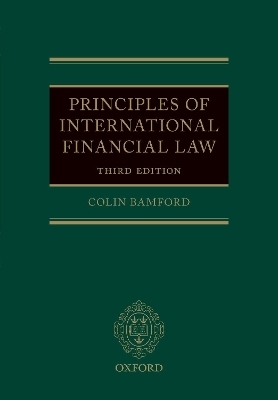
Principles of International Financial Law
Seiten
2019
|
3rd Revised edition
Oxford University Press (Verlag)
978-0-19-883270-6 (ISBN)
Oxford University Press (Verlag)
978-0-19-883270-6 (ISBN)
The third edition continues to provide succinct analysis of the principles, rules, and concepts underpinning the practice of international finance and is updated to include cryptocurrencies and technology in financial markets.
This book explains the legal principles, rules, concepts, and developments that underpin the practice of financial law in common law countries, and by extension across the world.
One of the aims of the book is to explain clearly the basis of the concepts applied by the common law to financial transactions. As part of this aim the third edition analyses in detail the interface between common-law and civil law approaches in areas such as the distinction between property and personal rights. The section on the ability of States to control the use of their money has also been substantially rewritten to address increasing demands in the US that sanctioned persons and states should be denied access to the US monetary system, recording both the increased incidence of activity by the US authorities, and also explaining in more detail the rationale of these actions.
Since the last edition was written there have been a number of developments in the technology used in the financial markets that question the legal principles on which they operate. In particular, the impact of Distributed Ledger Technology (e.g. Blockchain) on the transfer of intangible assets and the effect on the rights of parties involved is considered from both a legal and practical position. Additionally, the legal implications of the use of cryptocurrencies, including their use as Initial Coin Offerings, are also considered.
This is an essential work for both experienced lawyers and those who are relatively new to international financial law. It provides the more experienced lawyer with an aide memoire on the existing law and a reference source for new ideas when tackling innovative structures or products. For those new to practice or postgraduate students this book delivers a firm foundation upon which to build knowledge of the law and practice of financial law.
This book explains the legal principles, rules, concepts, and developments that underpin the practice of financial law in common law countries, and by extension across the world.
One of the aims of the book is to explain clearly the basis of the concepts applied by the common law to financial transactions. As part of this aim the third edition analyses in detail the interface between common-law and civil law approaches in areas such as the distinction between property and personal rights. The section on the ability of States to control the use of their money has also been substantially rewritten to address increasing demands in the US that sanctioned persons and states should be denied access to the US monetary system, recording both the increased incidence of activity by the US authorities, and also explaining in more detail the rationale of these actions.
Since the last edition was written there have been a number of developments in the technology used in the financial markets that question the legal principles on which they operate. In particular, the impact of Distributed Ledger Technology (e.g. Blockchain) on the transfer of intangible assets and the effect on the rights of parties involved is considered from both a legal and practical position. Additionally, the legal implications of the use of cryptocurrencies, including their use as Initial Coin Offerings, are also considered.
This is an essential work for both experienced lawyers and those who are relatively new to international financial law. It provides the more experienced lawyer with an aide memoire on the existing law and a reference source for new ideas when tackling innovative structures or products. For those new to practice or postgraduate students this book delivers a firm foundation upon which to build knowledge of the law and practice of financial law.
Colin Bamford has worked as a barrister at 3-4 South Square where he advised on a range of issues relating to the banking and securities industries. He is an Honorary Fellow of the Society for Advanced Legal Studies and a member of its Advisory Committee, a former Visiting Senior Fellow at London School of Economics, and a member of the committee of the Centre for Corporate Law at the Institute of Advanced Legal Studies.
1: Introduction
2: Money
3: Payment
4: Personal and Property Rights
5: Intangibles as Property
6: The Legal Nature of the International Bond Market
7: Fiduciary Duties and How They Arise
8: Fiduciary Duties in Financial Markets
9: Credit Support in Financial Markets
10: Security Interests
11: The Construction of Financial Contracts
| Erscheinungsdatum | 21.02.2020 |
|---|---|
| Verlagsort | Oxford |
| Sprache | englisch |
| Maße | 169 x 242 mm |
| Gewicht | 658 g |
| Themenwelt | Recht / Steuern ► EU / Internationales Recht |
| Recht / Steuern ► Wirtschaftsrecht ► Bank- und Kapitalmarktrecht | |
| ISBN-10 | 0-19-883270-2 / 0198832702 |
| ISBN-13 | 978-0-19-883270-6 / 9780198832706 |
| Zustand | Neuware |
| Haben Sie eine Frage zum Produkt? |
Mehr entdecken
aus dem Bereich
aus dem Bereich
Einkommensteuer, Körperschaftsteuer, Gewerbesteuer, Bewertungsgesetz …
Buch (2024)
Springer Gabler (Verlag)
27,99 €
CRR, IFR, SSM-VO, SRM-VO, EBA-VO
Buch | Softcover (2024)
dtv Verlagsgesellschaft
21,90 €
Währung, Bankenaufsicht, Zahlungsverkehr/Kredit
Buch | Softcover (2024)
dtv Verlagsgesellschaft
21,90 €


